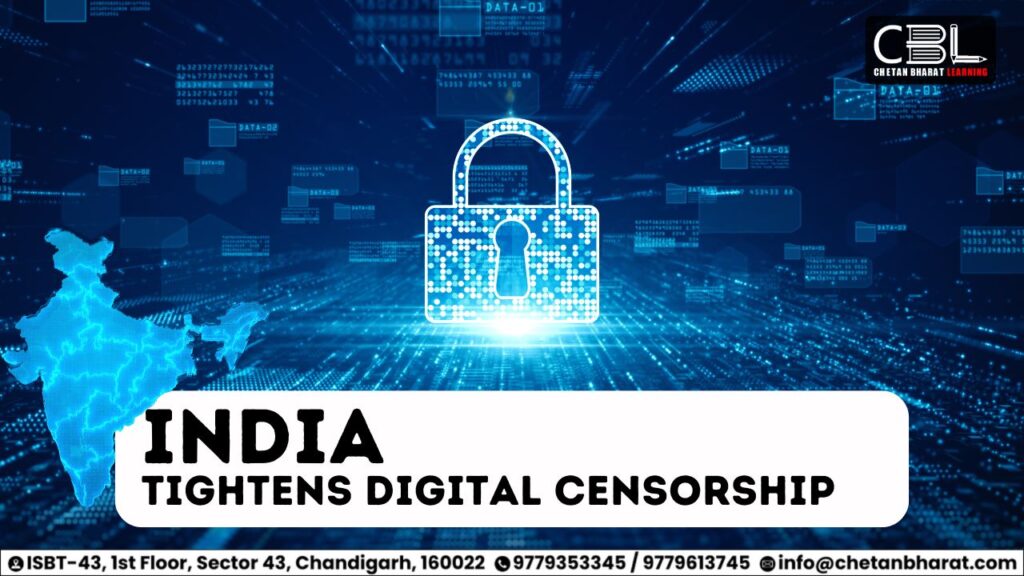
Important for UPSC, State PCS
Prelims: IT Act, Digital India Bill, and Broadcasting Regulation Bill
Mains: General Studies Paper 3- Basics of cyber security , Supreme Court rulings on freedom of expression, internet shutdowns, and platform liability .
Context-
- Censorship of digital content in India has sparked widespread debate, particularly with the rise of social media platforms, streaming services, and independent journalism.
- The recent controversy surrounding the show ‘India’s Got Latent’ has reignited discussions about digital censorship.
What Does the Law Say About Vulgarity ?
- Supreme Court’s View: In Apoorva Arora v. Govt. of NCT of Delhi (2024), the Supreme Court ruled that foul language alone is not a crime. Only content that arouses sexual or lustful thoughts is considered obscene.
- Ranveer Allahabadia’s Case: His remarks were crude but do not meet the legal definition of obscenity. The Supreme Court called his mind “very dirty,” but that does not make his words criminal.
- Blocking Websites: Despite the legal position that “decency and morality” are not grounds for blocking websites under Section 69A of the Information Technology Act, the government has increased censorship through the Information Technology (Intermediary Guidelines and Digital Media Ethics Code) Rules, 2021.
- Past Example: In 2021, Tandav faced criminal cases for hurting religious sentiments, forcing creators to edit scenes. The government later introduced stricter IT Rules, increasing digital censorship.
India’s Escalating Digital Censorship
 Key Developments
Key Developments
- Legal Action by X (formerly Twitter): Elon Musk’s platform, X, has filed a lawsuit against the Indian government, alleging misuse of laws to censor content. The case challenges the government’s directives that X claims bypass legal safeguards and expand censorship powers without proper oversight
Government’s Stance: The Indian government defends its actions, stating that the measures are aimed at ensuring compliance with national laws and maintaining social harmony. Officials argue that the platforms are obligated to adhere to the country’s regulations concerning content moderation.
Controversies in Digital Content: Incidents like the backlash against YouTuber Ranveer Allahbadia for his remarks on a comedy show have reignited discussions on digital content regulation. The government’s response to such events includes considering stricter regulations for online platforms.
 Legal and Regulatory Landscape
Legal and Regulatory Landscape
- Information Technology Act, 2000: The primary legislation governing digital content in India, which includes provisions for content removal and platform liabilities.
Proposed Digital India Bill: Aimed at overhauling existing digital laws, the bill seeks to address issues like data protection, platform accountability, and content regulation. However, it has faced criticism for potential overreach and lack of clarity.
Broadcasting Services (Regulation) Bill: Intended to regulate digital news and OTT platforms, this bill has also been scrutinized for possibly increasing government control over online content.
 Implications and Concerns
Implications and Concerns
- Freedom of Expression: Critics argue that the tightening of digital censorship could infringe upon free speech rights and suppress dissenting voices.
- Platform Compliance: Tech companies face challenges in balancing compliance with Indian laws and upholding global standards for user rights and content moderation.
- Legal Precedents: The outcomes of ongoing legal battles, such as X’s lawsuit, could set significant precedents for digital governance and platform-government relations in India
 Conclusion
Conclusion
India stands at a critical juncture where digital governance must harmonize national security imperatives with constitutional freedoms. While the government’s intent to curb misinformation, hate speech, and unlawful content is legitimate, an overemphasis on executive control risks undermining democratic values, transparency, and trust in institutions.
A well-defined legal framework, judicial oversight, and stakeholder consultations are essential to ensure that content regulation does not evolve into digital authoritarianism.
Striking the right balance between safeguarding sovereignty and upholding citizens’ rights will define the credibility of India’s digital future.
CBL Practice Questions for Prelims –
Which of the following acts as the primary legal framework governing digital content and intermediary liability in India?
A. Indian Penal Code, 1860
B. Information Technology Act, 2000
C. Digital India Bill, 2023
D. Cyber Security Act, 2018

The Information Technology Act, 2000 governs digital content, cyber crimes, and intermediary liabilities.
CBL Mains Practice Question –
How can India ensure transparency and accountability in digital content regulation without compromising national interest? Suggest a policy framework.




Leave a Reply
You must be logged in to post a comment.